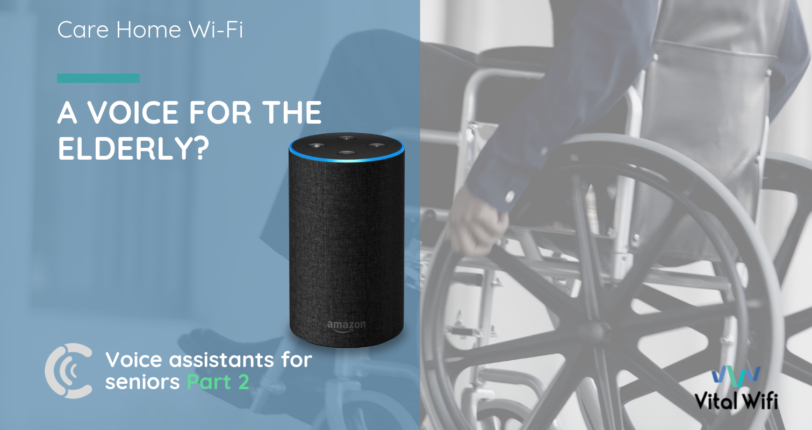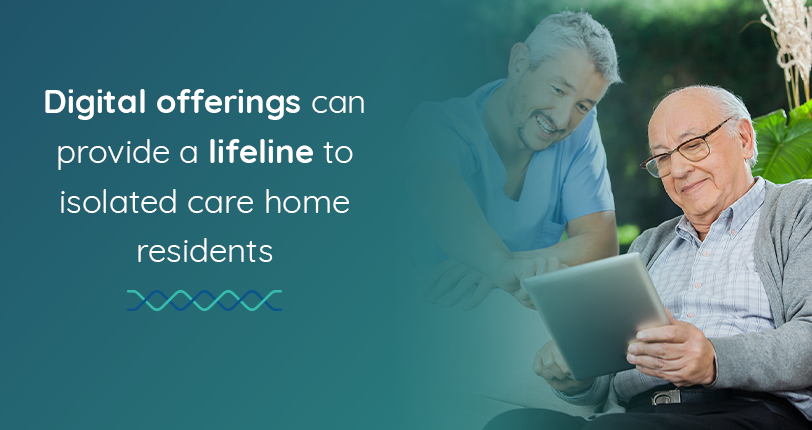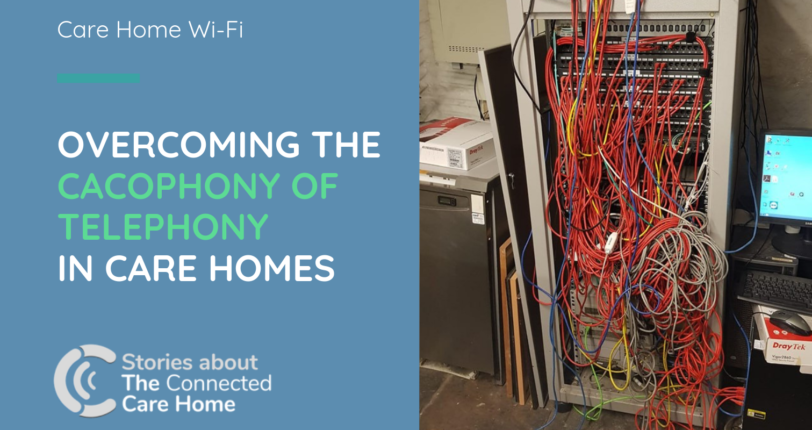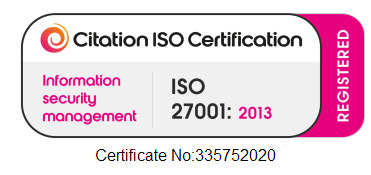Can Voice Assistants in care homes transform residents’ experiences?
The rise of voice assistants, such as the Amazon Alexa, has opened a whole new avenue for supporting the elderly, including dementia sufferers. Often thought of as a gimmick, voice assistants in care homes can be life-changing for seniors, especially for residents with limited mobility.
A voice assistant is a relatively low-cost device. Voice assistant technology can be used with immediate benefits to residents and carers. All that’s required is a stable WiFi network, such as SeniorConnect, to ensure reliable coverage to each room.
Strong WiFi can also help market a care home to prospective residents. More so when the specifier is a young family member more in tune with digital technology.
With recent sensationalist publicity about futuristic robots offering care for care home residents, it’s easy to dismiss AI-driven technology as out of this world and a distraction.
But the reality is there are many tangible, practical and genuine benefits to having residents engage with a digital care home. It needn’t be complicated nor expensive. There are many affordable solutions available and ready to go, so long as there’s a robust WiFi network.
Six Problems Voice Assistants in Care Homes Can Solve for Elderly Adults
A voice assistant, also known as an ‘intelligent virtual assistant’ (IVA) or a ‘connected consumer device’ (CCD), can help elderly citizens overcome common dangers. Such as falling, forgetting or being isolated. Here are six areas we have identified:
1. Alert Carers to Falls
Falls are one of the most common dangers amongst the elderly and are on the rise in care homes as staffing levels are decreasing. Every minute, six people over 65 suffer a fall with such accidents accounting for 10% of ambulance calls and cost the NHS over £2.3 billion each year (British Geriatrics Society).
A resident may fall, and if they can’t reach their nurse call or emergency alert cord, they could be lying in pain for some time. So voice recognition software can be a lifesaver in this instance.
2. Forgetfulness
It’s not just birthdays that voice assistants in care homes can remind you about. If you want to know the time and want to know it every few hours (or minutes even) because you suffer from dementia. It will always answer in a polite tone of voice, no matter the question or the number of times it has been asked. The voice assistant can also notify when it’s time to take medication. Daily routines can be uploaded to the device and spoken aloud when specific tasks become due.
Voice recognition can remind the user when to pay a bill, how much is due and even pay it for you. With some systems, like Beyond Television, you can use voice assistants in care homes to control television channels.
Want a coffee? Ask the voice assistant for one!
3. Reduce Isolation
Loneliness is a significant contributor to Alzheimer’s and in the UK can increase the risk of premature death by up to 25% as well as lead to alcoholism and depression. Technology can help address this by enabling regular contact with distant friends and family and with voice assistants, they can keep their minds sharp and get reminders of social appointments. While not a replacement for companionship, they do provide a degree of interaction with the outside world in a way that screen- or keyboard-based devices may not.
Amazon’s Alexa can read you audiobooks (it’s connected to the Amazon Audio Book Store, Audible featuring 100,000+ titles). You can request any music, too. An excellent way for the elderly to reminisce.
4. Day-to-Day Help
But voice assistant in care homes can also help senior residents in more everyday situations.
Simple tasks, such as making shopping lists or setting reminders (like visiting grandchildren or hair appointment) become a breeze. With the right integrations, residents can even control the heating and lighting with voice commands. And there’s no physical ability required. All can be done directly from the bed or chair.
5. Ease of Access
Despite the benefits that new digital technology brings, it can often be a challenge for seniors to engage with it. With a voice assistant, you need to use your voice to make a phone call, send an email, have a text message read back to you.
6. Security
As a person’s voice pattern is unique, just as a fingerprint is, you can use technology to lock and unlock doors and devices.
What Evidence is There That Voice Assistant in Care Homes Work?
Trials have recently been carried out by Hampshire County Council and Oxfordshire County Council’s Adult Social Care to see how a voice assistant could reshape the way social services provide daytime support to people.
It’s ideal for visually impaired residents. One of the trialists, 78-year old Catherine J. who has a rare eye condition that made her blind two years ago, found using the Alexa helped her enormously with something as simple as just asking the time.
She adds: “I thoroughly recommend Alexa. It’s not natural for me, and in the beginning, I was a little afraid. Not now, though. There’re quite a few hours that you can be on your own, and this keeps me company and keeps the grey matter moving. You can’t vegetate.”
Care workers can also benefit as it removes some of the strain from the frequent demands and questions that they would otherwise get.
Caroline Moloney, Group Contract Manager at DANA (Day and Nightmare Assistance), commented: “Not only have our clients loved the new system – but it’s also had a great impact on their families too, especially those who live further afield because they can see how their loved ones are getting on. There’s nothing more heart-warming than seeing a smiling face!”
Useful Feedback
Most voice assistants keep a record of every query. This is a double-edged sword as while it’s beneficial for monitoring behaviour patterns. It also has data privacy compliance implications with the GDPR.
What Do Voice Assistants in Care Homes Do?
You can ask voice assistants in care homes to play music, what’s the weather forecast, add to a to-do list, read you an audiobook, or the news, and much more. With compatible smart-home devices, you can tell it to dim the lights or turn appliances on or off. You interact with the device hands-free making it very easy.
How Do Voice Assistants in care homes work?
It connects to the web via a WiFi network. The device is always on and listening for a ‘wake’ word to wake it up. Once it hears that, the device gathers the voice commands that follow and sends them to a natural voice recognition service in the cloud called (in the case of Amazon Echo, the Alexa Voice Service), which interprets them and returns the appropriate response. The device has sensitive microphones that can hear your voice from across the room, even over music and other environmental noise.
Amazon is continually adding more services to its Echo, and the Alexa cloud service is available for use by other developers, opening it up to many future applications.
Jargon – Acronyms Describing a Voice Assistant
VUI – Voice User Interface
IVA – Intelligent Virtual Assistant
VA – Voice Assistant
IAT – Intelligent Assistive Technology
CCD – Consumer Connected Device
AI – Artificial Intelligence
IVA – Intelligent Virtual Assistant
NOTE: while Voice Assistants in care homes do not require linking to a smartphone, they do mostly require a robust WiFi network. Care homes interested in upgrading their system can apply for a free site survey and report from Vital WiFi, a specialist in deployment and management of WiFi in care homes.
SeniorConnect is a managed WiFi system that requires little or no upfront investment and can be funded from the operational expenditure.
To apply for a free W-Fi Site Survey & Assessment Report contact Vital WiFi on:
e: seniorconnect@vitalWiFi.com
t: 0333 3583111
w: https://comms.vitalWiFi.com/request-survey
‘The Connected Care Home – An owner’s Guide’ can be downloaded here:
https://comms.vitalWiFi.com/tcch-get
SOURCES:
AGE UK Later Life in the UK April 2018 ~ Loneliness and risk of Alzheimer disease. Wilson RS, Krueger KR, Arnold SE, Schneider JA, Kelly JF, Barnes LL, et al. Arch Gen Psychiatry 2007 Feb
AGE UK Later Life in the UK April 2018 ~ Holt Lunstad, J. et al; Brigham Young University, March 2015, Perspectives on Psychological Science
http://www.danacare.co.uk/our-news/at-the-forefront-of-technology-in-social-care






